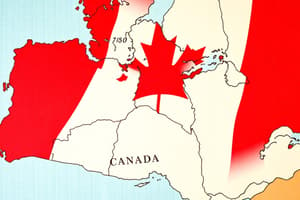Podcast
Questions and Answers
What was the purpose of the Confederation Act, also known as the British North America Act, 1867?
What was the purpose of the Confederation Act, also known as the British North America Act, 1867?
- To establish the new Dominion of Canada (correct)
- To declare independence from Britain
- To abolish the Senate
- To expand representation in the House of Commons
Which provinces were part of the original Canadian Confederation in 1867?
Which provinces were part of the original Canadian Confederation in 1867?
- Alberta, Saskatchewan, Manitoba, British Columbia
- Ontario, Quebec, Nova Scotia, New Brunswick (correct)
- Manitoba, British Columbia, Newfoundland, Nunavut
- Prince Edward Island, Yukon, Northwest Territories, Manitoba
Who were considered the original Fathers of Confederation?
Who were considered the original Fathers of Confederation?
- Delegates who attended the Charlottetown and Quebec conferences (correct)
- Military leaders during the Canadian Confederation
- Indigenous chiefs from various tribes
- European traders who settled in Canada
How did the Confederation Act impact the political structure of Canada?
How did the Confederation Act impact the political structure of Canada?
Which individual was instrumental in bringing Newfoundland into Confederation?
Which individual was instrumental in bringing Newfoundland into Confederation?
What document changed the name of the British North America Act to the Constitution Act, 1867 and expanded representation in the House of Commons in 1982?
What document changed the name of the British North America Act to the Constitution Act, 1867 and expanded representation in the House of Commons in 1982?
What were the original four provinces of Canada upon Confederation?
What were the original four provinces of Canada upon Confederation?
Which groups were not included in the decision-making process of the creation of the Dominion of Canada?
Which groups were not included in the decision-making process of the creation of the Dominion of Canada?
What is the significance of Indigenous communities in shaping Canadian history according to the text?
What is the significance of Indigenous communities in shaping Canadian history according to the text?
What type of system was established by the Confederation Act for the Dominion of Canada?
What type of system was established by the Confederation Act for the Dominion of Canada?
How is representation in the House of Commons determined in Canada?
How is representation in the House of Commons determined in Canada?
What division of government was established by the Confederation Act?
What division of government was established by the Confederation Act?
Flashcards
Canadian Confederation
Canadian Confederation
The process where Ontario, Quebec, Nova Scotia, and New Brunswick united to form the Dominion of Canada on July 1, 1867.
Confederation Act
Confederation Act
Established the Dominion of Canada, outlining a parliamentary system with federal and provincial governments and establishing the Senate and House of Commons.
Fathers of Confederation
Fathers of Confederation
Delegates who attended conferences leading to Confederation, instrumental in creating the Dominion of Canada. Includes those who brought in Manitoba, BC, Newfoundland and Nunavut.
Founding Provinces
Founding Provinces
Signup and view all the flashcards
Political Structure of Canada
Political Structure of Canada
Signup and view all the flashcards
Constitution Act, 1867
Constitution Act, 1867
Signup and view all the flashcards
Parliamentary Structure
Parliamentary Structure
Signup and view all the flashcards
Study Notes
Canadian Confederation
Canadian Confederation was the process by which the British North American provinces of Ontario, Quebec, Nova Scotia, and New Brunswick united into a federation called the Dominion of Canada on July 1, 1867. This union marked the beginning of a nation that would eventually span from sea to sea and would see numerous territorial changes and expansions over the years.
Confederation Act
The Confederation Act, also known as the British North America Act, 1867, was the document that established the new Dominion of Canada. The act laid out the structure of the government, outlining a parliamentary system with a federal government and provincial governments. The act also provided for a Senate and a House of Commons, with representation based on population. The act was amended in 1982, changing its name to the Constitution Act, 1867, and expanding the representation in the House of Commons.
Founding Fathers
The original Fathers of Confederation were the delegates who attended the conferences at Charlottetown and Quebec, leading to Confederation. These men were instrumental in the creation of the Dominion of Canada. The definition of who should be considered a Father of Confederation can be expanded to include those who were instrumental in the creation of Manitoba (Louis Riel), bringing British Columbia (Amor de Cosmos) and Newfoundland (Joey Smallwood) into Confederation, and the creation of Nunavut (Tagak Curley).
Founding Provinces
Upon Confederation, Canada consisted of four provinces: Ontario and Quebec, which had been split out from the Province of Canada, and the provinces of Nova Scotia and New Brunswick.
Impact on Indigenous Peoples
The creation of the Dominion of Canada did not include Indigenous peoples in the decision-making process. Many Indigenous communities opposed Confederation and have shaped the way we think about Canada as much as the Fathers of Confederation. Their histories and stories are integral to understanding the complex and diverse landscape of Canada.
Political Structure
The Dominion of Canada was established as a federal union of the British North American colonies, with a parliamentary system. The government was divided into a federal government and provincial governments, with representation in the House of Commons based on population. The Confederation Act also established a Senate and a House of Commons.
The political structure of Canada has evolved over time, with the Constitution Act, 1867 being amended in 1982, changing its name and expanding the representation in the House of Commons. The political landscape of Canada is characterized by a strong federal government, with powers divided between the federal and provincial governments.
Studying That Suits You
Use AI to generate personalized quizzes and flashcards to suit your learning preferences.




